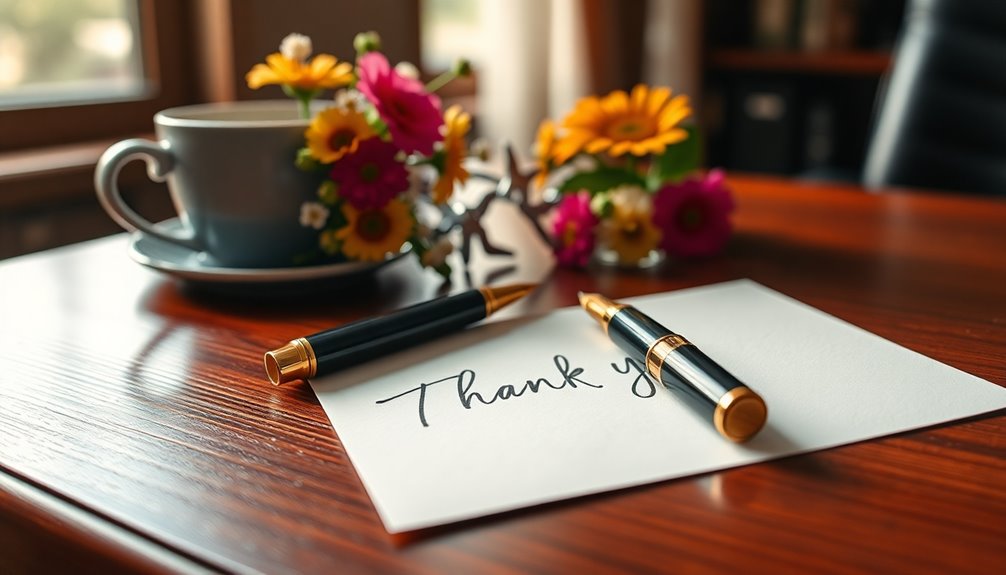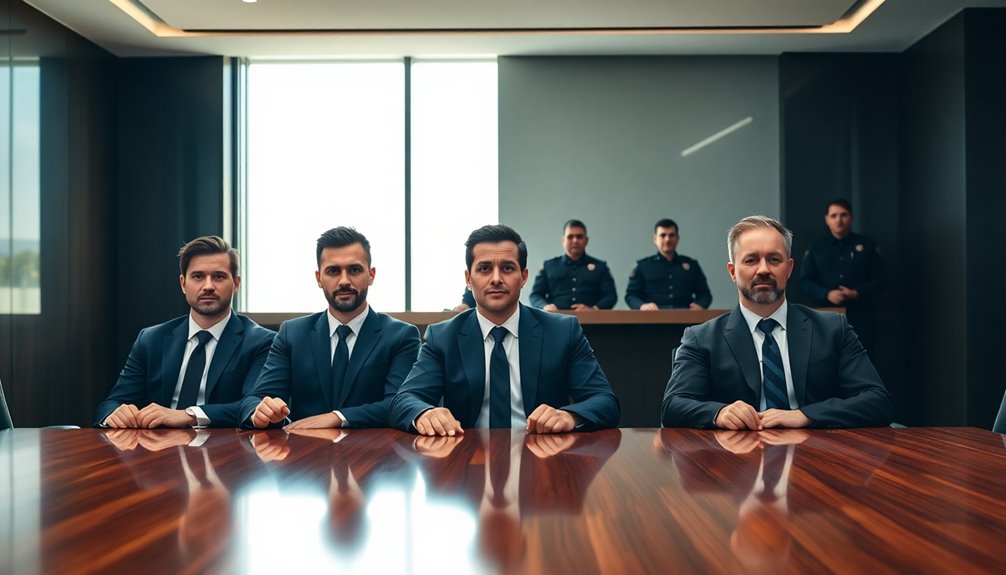Replying to a job interview email promptly is essential. Aim to send your response within 24 hours to show enthusiasm. Start with a clear subject line that includes the job title. Thank the interviewer sincerely and mention specific topics from your discussion. Personalize your email to reflect the company's culture. Avoid common pitfalls like vague replies or grammatical errors, as these can hurt your chances. Using customizable templates can simplify your process and guarantee professionalism. If you want to discover effective templates and more tips for success, you might find the following insights quite handy.
Key Takeaways
- Timely responses within 24 hours of receiving the interview email demonstrate enthusiasm and maintain momentum in the hiring process.
- Personalize your email to reflect the company's culture and reference specific topics discussed during the interview.
- Use a clear subject line that includes the job title to ensure immediate recognition of your email's purpose.
- Express gratitude for the opportunity and reiterate your interest in the position to reinforce a positive impression.
- Proofread your email carefully to avoid errors and ensure professionalism, enhancing your credibility with recruiters.
Understanding the Importance of Follow-Ups

Follow-ups after a job interview aren't just polite gestures; they're essential for reinforcing your professional image. Sending a timely thank-you email within 24-48 hours demonstrates your continued interest in the position and keeps the lines of communication open with recruiters. Silence can be misinterpreted as disinterest, which could hurt your chances.
The importance of follow-up emails can't be overstated. They enhance your professional image and help you stand out among other candidates. In fact, 75% of HR managers find thank-you emails helpful in the hiring decision process, so your email could make a significant impact. By reminding interviewers of your conversation, you aid their memory retention, making it more likely they'll remember you when the time comes to make a hiring decision.
Consistent follow-ups also keep you top-of-mind for recruiters. If they're juggling multiple candidates, your proactive communication can set you apart. So, take the time to craft that follow-up email. It's not just about being polite; it's a strategic move that can influence the outcome of your job search. Additionally, understanding key trends in hiring, such as AI-driven personalized experiences, can enhance your approach. Remember, your professional image matters, and every interaction counts.
When to Send Your Response
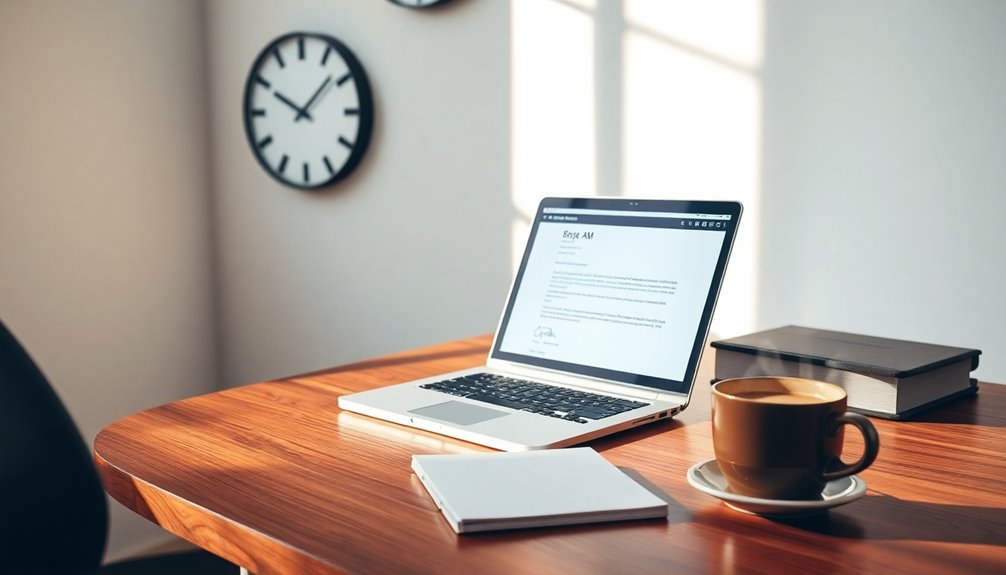
When you receive a job interview email, timing your response is essential. Aim to reply within 24 hours to show your enthusiasm and professionalism, but also consider the interview context and the company's culture. Sending your response during business hours, rather than on weekends or holidays, respects the interviewer's schedule and keeps you top of mind.
Ideal Response Timing
Responding to a job interview email promptly is essential for making a positive impression. It's best to send an email within 24 hours of receiving the interview invitation or follow-up. This quick response demonstrates enthusiasm for the position and shows respect for the interviewer's time. Timeliness in replying can keep your application fresh in the interviewer's mind, reinforcing your candidacy.
The importance of sending a thank you email cannot be overstated. A swift reply helps maintain momentum in the hiring process, making you stand out among other candidates who may delay their responses. Remember, a quick reply can set you apart, as many applicants might take longer, diminishing their impact.
Avoid sending your response during weekends or holidays; aim for business hours instead. This guarantees that your email is received when it can be properly considered. Staying proactive not only reflects your commitment but also keeps you at the forefront of the interviewers' thoughts. So, when you respond to a job interview email, don't hesitate—act promptly to solidify your positive impression.
Consider Interview Context
Understanding the context of your interview can greatly influence when you send your response. Timing your email after the interview is essential to demonstrate enthusiasm and respect for the interviewer's time. Here are three key factors to take into account:
- Respond Promptly: Aim to send your email within 24 hours of receiving the interview invitation. This shows you're engaged and appreciate the opportunity.
- Business Hours: Be mindful of the interviewer's time zone. Make sure your response arrives during their business hours to enhance the chances of a timely review.
- Confirm Your Availability: If the interview is scheduled, promptly confirm your availability to avoid any scheduling conflicts. If additional information is requested, respond thoughtfully within the same timeframe.
Align With Company Culture
Aligning your response with the company culture can greatly enhance your chances of making a positive impression. Understanding the company's values and communication style helps you craft an email after the interview that resonates with your interviewers. If you noticed a collaborative atmosphere during your discussions, express your gratitude and enthusiasm for the opportunity to join such a team.
Be mindful of response times; sending your email within 24 hours demonstrates your readiness and respect for the process. This quick turnaround shows that you value the time and effort the interviewers have invested in you.
Incorporate elements from the interview that reflect the company's mission or recent projects. Doing so will showcase your alignment with their culture and objectives. For instance, if innovation was a key theme, mention how excited you are about contributing to future projects.
Ultimately, aligning your email with the company culture can position you as a fitting candidate who not only understands their values but is also ready to contribute positively to their team. By tailoring your communication style, you'll leave a lasting impression.
Essential Email Components
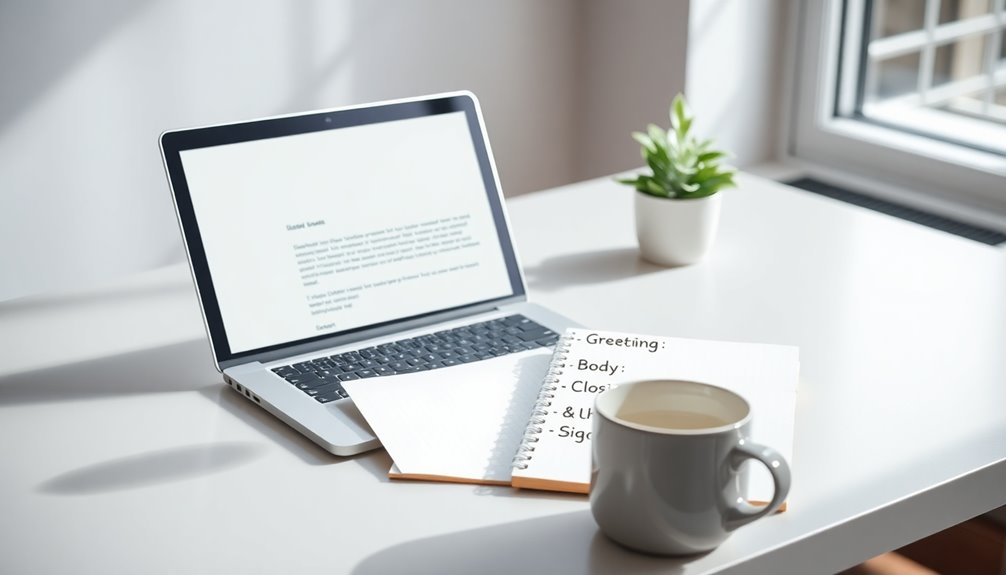
When replying to a job interview email, start with a clear subject line that reflects your message, like "Thank You for the Interview Opportunity." Next, use a professional greeting that addresses the interviewer by name to establish a respectful tone. These components set the stage for a thoughtful and engaging response.
Clear Subject Line
A clear subject line is essential for effective communication in a job interview email. It provides immediate recognition, helping the recipient understand your email's purpose at a glance. When crafting your subject line, aim for conciseness and relevance to guarantee clarity. Here are three effective approaches:
- Thank You for the Interview: This straightforward subject line expresses gratitude and sets a positive tone.
- Follow-Up on [Job Title] Interview: This option clearly indicates the email's intent and ties back to your recent discussion.
- Re: [Previous Subject]: If you're replying to an existing email thread, using "Re:" enhances continuity and keeps the conversation organized.
Avoid vague subject lines that can lead to confusion or cause your email to be overlooked. A strong, clear subject line not only reflects professionalism but also creates a lasting impression. It signals to the recipient that you value their time and are serious about the position. By using a clear subject line, you increase the likelihood of receiving a prompt response, making your follow-up more effective.
Professional Greeting
Following a clear subject line, a professional greeting is essential for your job interview email. It sets the tone and shows respect to the recipient. Start with a courteous salutation like "Dear [Interviewer’s Name]" or "Hello [Interviewer’s Name]." This approach conveys a respectful and formal demeanor.
Using appropriate titles, such as Dr., Mr., or Ms., unless told otherwise, helps maintain professionalism. Personalizing your message by including the interviewer's name strengthens rapport and demonstrates your attention to detail.
Here's a quick reference table for professional greetings:
| Greeting Style | Example |
|---|---|
| Formal | Dear Dr. Smith |
| Semi-Formal | Hello Ms. Johnson |
| Casual (if appropriate) | Hi John |
Ensure your greeting aligns with the communication method used by the interviewer. If they opted for a more formal approach in prior correspondence, keep that tone. This adaptability reflects both professionalism and respect, vital in making a lasting impression. Remember, the way you greet your interviewer can set the stage for the conversation ahead.
Crafting Effective Subject Lines

Crafting an effective subject line is essential for ensuring your job interview email stands out in a crowded inbox. A clear subject not only grabs attention but also provides immediate recognition of your email's purpose. To make your subject lines impactful, consider these three tips:
- Be Direct: Use straightforward phrases like "Thank You for the Interview" or "Follow-Up on [Job Title] Interview." This clarity helps convey your email's intent effectively.
- Include the Job Title: Mentioning the specific job title in your subject line provides context and assists the hiring manager in locating your email among others.
- Avoid Vague Subject Lines: Steer clear of overly complex or ambiguous phrases. Vague subject lines can lead to confusion and diminish the effectiveness of your professional communication.
Personalizing Your Follow-Up
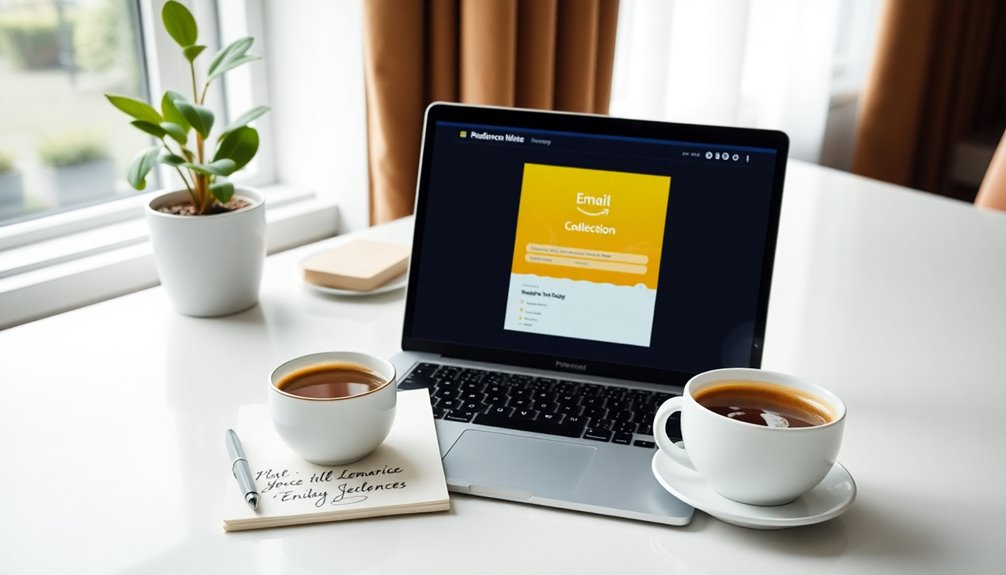
Personalizing your follow-up email can make a significant difference in how your message is received. By referencing specific topics discussed during the interview, you demonstrate attentiveness and increase engagement. Tailoring your follow-up to reflect the company culture and values not only reinforces your fit for the organization but also builds rapport with the interviewer.
Mentioning shared interests or connections can further strengthen relationships and enhance your memorability in the hiring manager's mind. This personal touch can set you apart from other candidates. Highlighting relevant skills or experiences that came up during the conversation emphasizes your suitability for the role, making your email more impactful.
Additionally, including personal insights or additional information that relates to your discussion can provide further value. This shows your genuine interest in the position and keeps you top-of-mind for recruiters. Remember, the goal is to create a lasting impression that showcases your engagement and enthusiasm. By personalizing your follow-up email, you not only reinforce your qualifications but also foster a connection that could benefit you in the long run. Consider how strong communication skills can enhance your relationships in the workplace and contribute to your success in the role.
Common Mistakes to Avoid

While it might seem straightforward, replying to a job interview email can easily lead to common pitfalls that jeopardize your chances of success. Avoiding these mistakes will help you maintain professionalism and make a positive impression:
- Neglecting Timely Follow-Ups: Respond promptly to your interview email. Delays can convey a lack of interest, which 69% of candidates fall into when they don't send timely follow-ups.
- Using Generic Responses: Personalize your replies by referencing specific discussion points from the interview. Generic thank you emails can make you seem disengaged, diminishing your chances of standing out.
- Failing to Proofread: Always proofread your email for spelling and grammatical errors. Mistakes can damage your credibility and reflect poorly on your attention to detail, both of which are essential in the hiring process. Additionally, maintaining a professional tone in your emails can enhance your personal development and create a lasting impression on potential employers.
Leveraging AI for Email Drafting
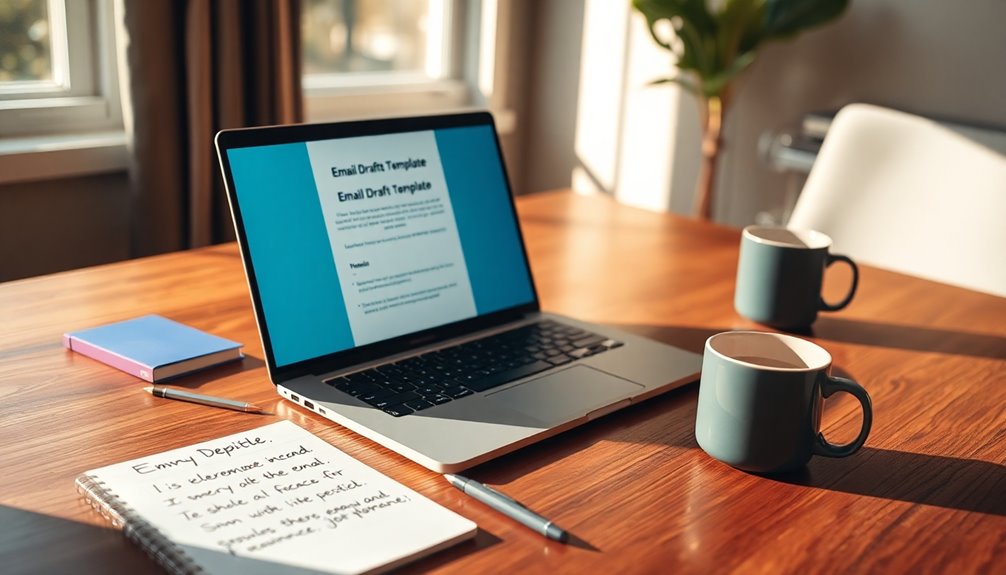
Replying to a job interview email can be streamlined with the help of AI tools designed for drafting professional communication. These tools, like MailMaestro, provide templates and suggestions tailored to job interview responses, making it easier for you to create engaging and personalized messages. By utilizing AI for email drafting, you can enhance the quality and professionalism of your communications. Additionally, the use of AI can lead to improved engagement through tailored educational resources that help you communicate more effectively.
Here's a quick overview of how AI tools can help you:
| Benefit | Description | Example Use Case |
|---|---|---|
| Streamline | Saves time in drafting responses | Pre-filled templates for job replies |
| Reduce Stress | Generates concise email responses | Automated follow-up emails |
| Real-Time Feedback | Analyzes tone and structure | Suggestions for a friendly demeanor |
| Enhance Quality | Improves the clarity and professionalism | Refining wording in your email |
| Multilingual Support | Translates emails into multiple languages | Applying to international positions |
Sample Templates for Responses
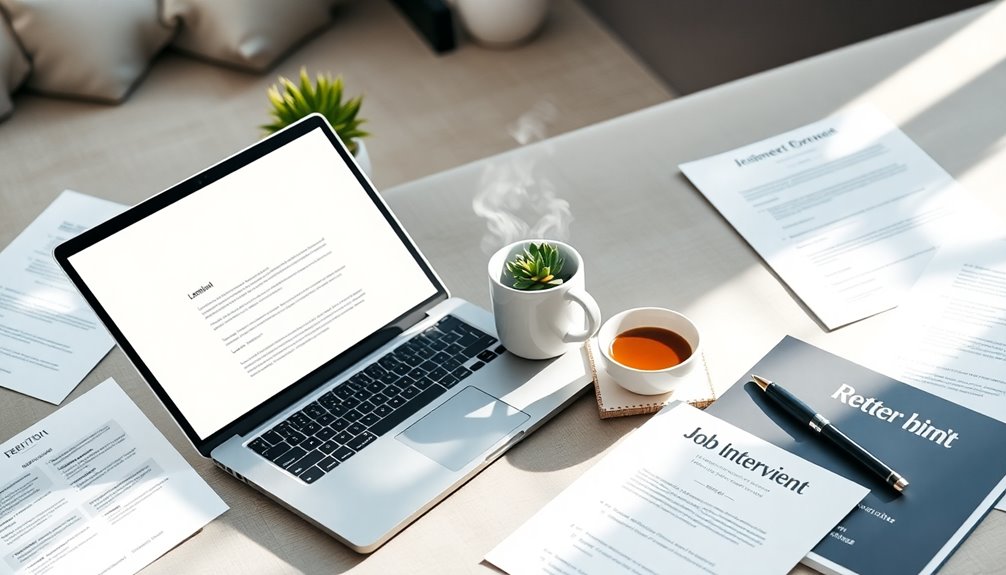
Crafting the perfect response to a job interview email is essential for making a lasting impression. A well-written thank-you email not only expresses your gratitude but also reinforces your interest in the role. Here are three sample templates you can customize:
1. Thank-You Email After Interview
Subject: Thank You for the Opportunity
"Dear [Hiring Manager’s Name],
Thank you for the opportunity to interview for the [Job Title] position. I appreciate our conversation and the insights you shared about the team. I'm excited about the possibility of contributing to [Company Name]."
2. Confirmation of Interview
Subject: Interview Confirmation for [Job Title]
"Hi [Hiring Manager’s Name],
I'm writing to confirm my interview scheduled for [Date and Time]. Please let me know if you need any additional information from my side."
3. Follow-Up Email
Subject: Follow-Up on [Job Title] Interview
"Dear [Hiring Manager’s Name],
I wanted to follow up on our recent interview. I'm still very interested in the role and would love to provide any additional information you may need."
Always proofread to maintain professionalism!
Frequently Asked Questions
How Do You Respond to a Successful Interview Email?
When you receive a successful interview email, it's important to respond promptly, ideally within 24 hours. Start by thanking the interviewer for their time and the opportunity. Express your excitement about the position and briefly highlight how your skills align with what they're looking for. Finally, ask about the next steps in the hiring process. This shows your enthusiasm and keeps the communication open and engaging. Keep it concise and professional!
How to Reply to an Interview Email Template?
When you're replying to an interview email, start by thanking the sender for the opportunity. Make certain to clearly state your confirmation of the date and time. If you need clarification on the location or format, don't hesitate to ask. Keep your tone professional but friendly, and include any requested information. Finally, sign off with your contact details to guarantee they can reach you easily.
How to Write a Thank You Email After an Interview Template?
Writing a thank-you email after an interview is essential. Start by expressing your gratitude for the opportunity and mention the specific position and company. Reference key topics you discussed to show you were engaged. Reinforce your qualifications by briefly summarizing how your skills align with what the company needs. Finally, wrap up with a professional sign-off and include your contact information to keep the lines of communication open.
How Do You Say Thank You for a Successful Interview?
Did you know that 86% of employers see a lack of a thank-you note as a sign of poor follow-through? To say thank you for a successful interview, craft a brief email within 24 hours. Express your gratitude for the opportunity, mention specific topics discussed, and highlight how your skills align with the role. This personal touch shows your attentiveness and reinforces your interest, making you stand out among other candidates.
Conclusion
In the world of job hunting, your response to an interview email can be the difference between opportunity and obscurity. A well-crafted reply showcases your professionalism, while a rushed response might send the wrong message. By taking the time to personalize your follow-up, you not only reinforce your interest but also leave a lasting impression. Remember, every email is a chance to stand out; seize it, and turn potential into success.


